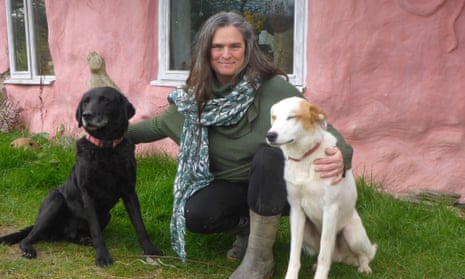Name: Cassandra Lishman
Age: 49
Income: £20,000
Occupation: Farmer and weaver
I live in a pink roundhouse made out of straw bales in Pembrokeshire. It’s very hobbit-like. There’s one big living space with an office, kitchen, living room, and a bedroom for my husband and I. As our kids have grown older – they’re 25, 16 and 13 now – we’ve created bedrooms for our two sons in our barn and made an eco hut out of straw bales for our daughter.
We’ve been part of the Lammas project, an eco village in Wales, since it was set up 10 years ago. I was inspired to change the way I lived after studying environmental science in my late twenties. It made me want to live very much in connection with the land and to provide our own food and electricity.
Our eldest child has special needs and we wanted him to grow up with plenty of space around him. We also wanted to live in a community with similar-minded people around us. It took us 10 years to make it happen.
The roundhouse cost £10,000 to build. We paid £35,000 for the leasehold which included planning permission and five acres of land. Our annual rent is £1 a year although we’ll soon own the freehold. It’s not what I would call low-cost housing. The cost is your energy. You have to have a large amount of willpower to do what we did. We had no spare money when we moved here and we had to create everything.
I think we’ve done what I set out to do: grow our own food, connect to the elements and provide our own resources. We cut our own firewood, have hydro power and solar panels and we feel like we’re not draining the planet’s resources.
We grow produce such as blackcurrants, gooseberries, courgettes, pumpkins, peas and chard. We probably produce about 30kg of strawberries a year and we’ll eat it fresh or turn it into jam or cordial. We have nut trees and apple trees. We have 9.5 acres of land and keep two ponies and sheep. It’s in a bit in flux at the moment, but currently there are 15 adults and 15 children living at Lammas. It’s a community but we don’t hold hands and chant every night like some people think! We are all very different and separate households.
I earn about £20,000 a year. Most of my income comes from growing my own willow and shearing our sheep, and using the materials to run willow-weaving and felt making workshops in adult learning centres and other arts groups. I also maintain the smallholding which at this time of year involves a lot of hedge laying, mulching beds in the garden, and animal care. If we have spare fruit or eggs in the summer, we sell them too. But we reinvest most of the money.
Looking back over the past 30 years, the majority of my money has been spent on organic food. That’s my top priority. My husband and I probably spend about £100 a week on food in addition to what we produce.
I feel very strongly about eating good organic food. It’s do with priorities and energy and I’d argue being organic is achievable for anyone. When I was broke and living in London, I started an allotment and grew my own veg. It costs you next to nothing – just time and effort. If people want to be more healthy and provide for themselves they can do it.
Organic clothes are hideously expensive but I do prioritise this when I can. If it’s for me, I probably spend a total of £30 a month on clothes. But it’s a lot more for the kids. We might spend about £150 a month on eating out as a family. We always try and shop local – even if it’s more expensive.
We don’t go holiday a lot but when we do we try to travel by train. A few years ago we went on an expensive trip that cost us a few thousand. We travelled all the way to Barcelona by train, staying a night in Paris on the way. After Barcelona we took a bus to Costa Brava and stayed in an eco cabin by the ocean. Yes, it took a long time to get there but for me it’s about the journey, not the destination.
